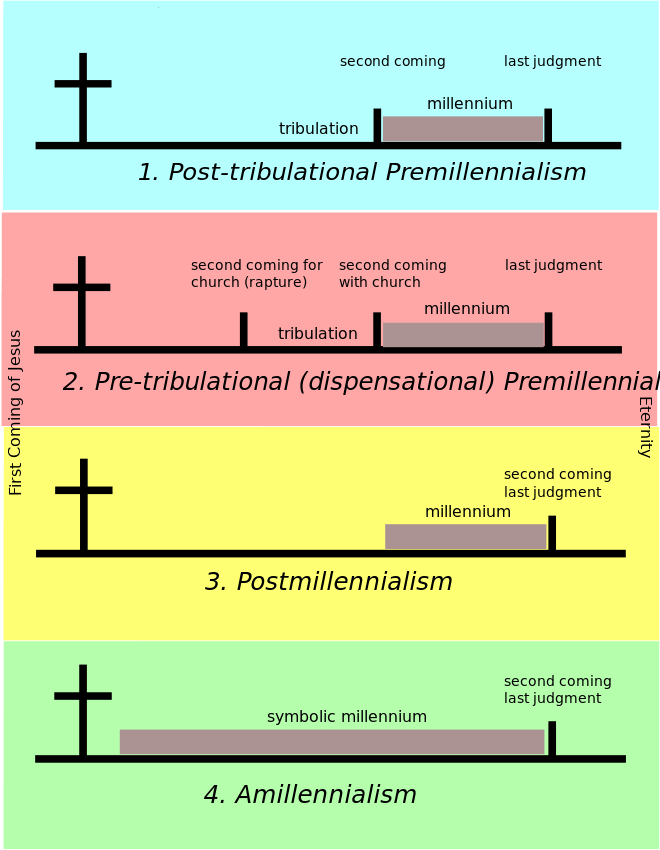[ also termed nunc-millennialism or inaugurated millennialism ]
Definition:
The amillennialist believes that the Kingdom of God was inaugurated at Christ’s resurrection (hence the term “inaugurated millennialism”) at which point he gained victory over both Satan and the Curse. Christ is even now reigning (hence the term “nunc-millennialism” — nunc means “now”) at the right hand of the Father over His church. After this present age has ended, Christ will return and immediately usher the church into their eternal state after judging the wicked. The term “amillennialism” is actually a misnomer for it implies that Revelation 20:1-6 is ignored; in fact, the amillennialist’s hermeneutic interprets it (and in fact, much of apocalyptic literature) non-literally.
Features and Distinctions:
Favored method of interpretation: redemptive-historical.
Israel and the church: The church is the eschatological fulfillment of Israel.
Kingdom of God: a spiritual reality that all Christians partake in and that is seen presently by faith, but will be grasped by sight at the consummation. [The eschatological fulfillment of God’s covenants with His earthly creation.]
The Rapture: The saints, living and dead, shall meet the Lord in the clouds and immediately proceed to judge the nations with Christ and then follow Him into their eternal state.
The Millennium: inaugurated with Christ’s resurrection. In an “already/not yet” sense, Christ already reigns over all and is already victorious over Satan.
Miscellaneous:
- Higher degrees of interpreting prophecy in light of Christ’s advent, death, resurrection, and glorification.
- Relies heavily on a two-age theology.
[Two-age theology: The branch of theological study focusing particularly upon the already / not yet eschatology presented in Scripture (e.g., the fact that we are already raised up with Christ and seated in the heavenlies (Eph. 2:6), but still await bodily resurrection (1 Cor. 15:50ff); or that we are already glorified (Rom. 8:30), but glorification is the last stage of our salvation and still awaiting consummation).]
Major proponents: Meredith Kline, Richard Gaffin, Robert B. Strimple, Gregory K. Beale, and John Murray.
Synopsis:

Eschatology is the study of the eschaton; the eschaton is equated with “last things.” While other views focus on the final days of humankind on earth, amillennialism sees “the last things” as having been initiated at Christ’s resurrection and so, being applicable from the earliest days of the Christian church (cf. Acts 2:16-21; 1 Corinthians 10:11; Hebrews 1:1-2; and 1 Peter 1:20). The amillennialist perspective sees the whole of God’s redemptive revelation as twofold – promise and fulfillment; it also emphasizes that a strict-literal interpretation of Old Testament is not necessarily the most accurate way of determining what the text means.
The amillennial perspective emphasizes that the coming of the Kingdom of God is a two-part event. The first portion dawned at Christ’s first advent (John the Baptist proclaimed at this time, “The kingdom of heaven is at hand” — Matthew 3:2). At the cross, Christ won final victory over death and Satan. And then He ascended to reign upon the throne of David forever (Luke 1:32-33; Acts 2:30-31). Now because we “look not at the things which are seen, but at the things which are not seen; for the things which are seen are temporal, but the things which are not seen are eternal” (2 Corinthians 4:18) — because of this, the amillennialist sees the final things already accomplished, though not yet seen by sight, but by faith (2 Corinthians 5:7).
An important note is the amillennialist’s view of the church in this world: a role of suffering. The Christian will be hated by all, just as was Christ (Matthew 10:22), for a servant is not greater than his master. Seeing this as the church’s role on earth — to suffer as did Christ — the amillenialist can hold no hope for an earthly exaltation and longs for the fulfillment of the second stage of the coming of the Kingdom.
This second stage of the amillennial perspective is the final consummation of all the heavenly promises. The Christian will no longer see by faith alone, but by sight. All the shadowy things will pass away and our eternal reign with Christ will begin. The amillennialist, expecting no earthly glory for the church, places all his hope on this heavenly glory.
Bibliography:
Hoekema, Anthony. The Bible and the Future. Grand Rapids: William B. Eerdmans Publishing Company, 1994. (ISBN: 0802808514)
Hendrikson, William. More Than Conquerors: An Interpretation of the Book of Revelation. Grand Rapids: Baker Books-, 1939. (ISBN: 0801057922)
Beale, G.K. The Book of Revelation: A Commentary on the Greek Text. Grand Rapids: William B. Eerdmans Publishing Company, 1999. (ISBN: 0-8028-2174-X)
Strimple, Robert B. “Amillennialism.” Three Views of the Millennium and Beyond. Ed. Darrell L. Bock. Grand Rapids: Zondervan Publishing House,1999. (ISBN 0-310-20143-8)
Extra Credit:
Vos, Geerhardus. The Pauline Eschatology. Grand Rapids: William B. Eerdmans Publishing Company, 1953.
Vos, Geerhardus. Biblical Theology. Grand Rapids: William B. Eerdmans Publishing Company, 1953.
Ridderbos, Herman. The Coming of the Kingdom. Philadelphia: Presbyterian &Reformed Publishing Company, 1962. (ISBN: 0-87552-408-7)
Source:
Eschatology :: Four Views on the Millennium. Blue Letter Bible. Retrieved from https://www.blueletterbible.org/faq/mill.cfm.
One reply on “Amillennialism Defined by Blue Letter Bible”
martin luther? was he a millinnnial and were him and calvin at odds in there opinion is this